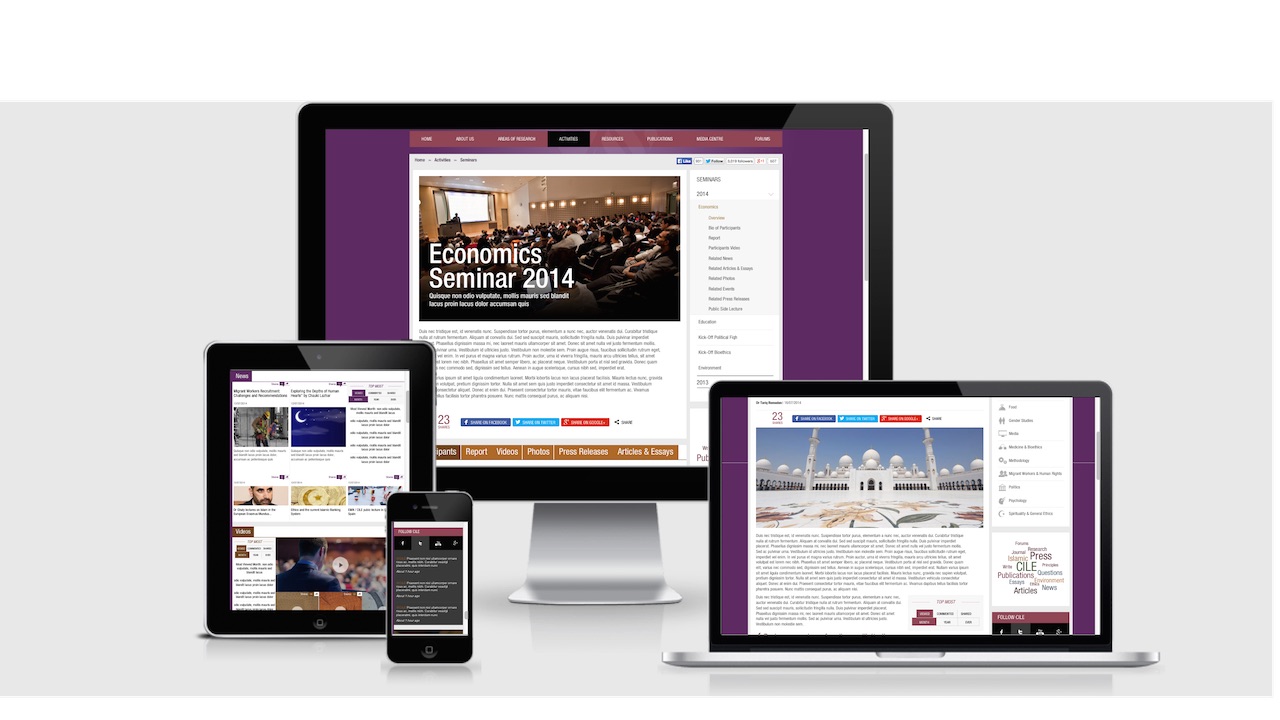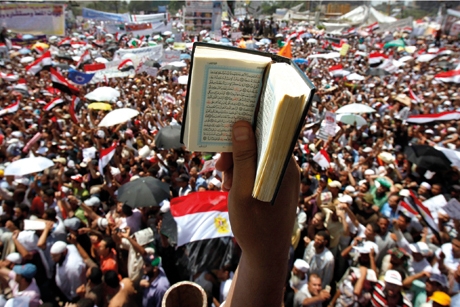This is the second excerpt from Tariq Ramadan’s Forthcoming BookThe question of scriptural sources
In the contemporary debate over “reform” within Islam’s universe of reference, the status of the Quran is repeatedly stressed. It is as if no reform could actually take place if the status of the Quran itself, as the very word of God revealed to men, was not discussed or questioned. In many interreligious circles (for some of our Jewish and/or Christian interlocutors) as well as by a number of Muslim thinkers, this condition is more or less clearly stated, sometimes in outrightly radical terms: Islam and Muslims will not be able to “evolve”, to “reform” their religion and practices, unless they question the Quran’s being the absolute word of God, and then undertake a historical-critical reading and exegesis which alone will permit a real aggiornamento of Islam similar to the Protestant Reformation or Vatican II. This argument is highly successful in the West, and the answer one gives about the status of the Quran seems to have become the feature setting “true” reformers apart from “neo-fundamentalist” simulators.
It is indeed important, when starting this general reflection about reform, to make a number of points clear and to discuss some ideas that are commonly accepted and yet highly disputable. At the heart of the Islamic creed (al-`aqîdah), among the six pillars of faith (arkân al-imân), lies the recognition of revealed books and the faith and belief that the Quran, the last Revelation, is the word of God (kalâm Allah) revealed to mankind as such in clear Arabic language (“lisânun `arabiyyun mubîn”[1]). To the believing conscience, this is one of the pillars of faith and any reform questioning one of the fundamentals of the creed, of the `aqîdah, could not be accepted, heard nor promoted by the Muslim faithful. It might be attractive to the restricted circles of rationalists, but it will always be perceived as (at best) out of place, or more clearly as a betrayal of Islamic teachings, by the bulk of believers (whether practising or not, actually). Indeed, this “excess of rationalism” on the part of some early or contemporary thinkers has often led to simply disqualifying the notion of “reform” altogether, since it was perceived as dangerous because it undermined the principles of the Muslim faith or was imported from the Christian universe of reference.
One must add that the very terms of this debate have generated postulates that need to be questioned. Thus, people tend to believe that dogmatic or literalist approaches are caused by the nature of the Quranic text, and that ascribing a human origin to it[2] would suffice to open the way to a historical and contextualised reading. However, this statement performs two dangerous shortcuts. The first one consists in assuming that the status of the text alone determines its readers’ mode of interpretation, while this is far from obvious or inevitable. The history of religions and ideologies is filled with examples of texts produced by guides or thinkers, which have been, and still are, read dogmatically by their adepts or followers. The status of the text can indeed influence the modalities of reading, but in the end, it is the mind and psyche of the reader interpreting it that projects its categories and the modalities of its interpretation onto the book. Up to very recent times, Marx’s works were sometimes read and interpreted in most dogmatic terms by most atheistic Marxists. A text’s human source by no means warrants a historicizing reading of its contents, and numerous Christian trends, while recognising the various historical strata of the Gospels’ elaboration, still advocate a literal reading of the New Testament. What must be assessed and questioned is often the outlook, psychological set-up and frame of reference of interpreting scholars, and the debate over the status of the text falls far short of resolving the issue of historical and contextualised interpretation.
The other shortcut is methodologically more serious and its consequences are far more harmful. It consists in exporting the experience of Catholic theology into the Islamic tradition: since the historical-critical approach was only possible, in the Christian tradition, once the human source of the New Testament had been acknowledged, it is assumed to be the same – by natural induction – for the Islamic legal tradition. However, this exogenous, imported outlook fails to do justice to the great legal tradition of Islam that has never, since the beginning, linked the status of the Quran (as the “eternal word of God” ) to the impossibility of historical and contextualised interpretation. Indeed, quite the contrary has occurred: from the outset, the Prophet’s companions (as-sahâba), the following generation (at-tâbi`ûn), then the scholars, the leading figures of the various sciences and schools of law, kept referring to the context, causes (asbâb) and chronology of revealed verses. The sciences and commentaries of the Quran (`ulûm al-Qur’ân and at-tafâsîr), the study of the Prophet’s life (as-sîra), the classification of prophetic traditions (`ulûm al-hadîth) are so many areas of study that were constituted while taking into account the historicality of the revealed Word as well as of the Prophet’s speech and action. The eternal Word of God was revealed within a specific history, over twenty-three years, and if some texts or injunctions transcend the human History that receives them, some other verses cannot be understood without being inserted within a particular time sequence. Then, human intelligence alone can determine the contents of the timeless principle drawn from the text, while necessarily taking into account its relation to the social and historical context of its enunciation. This critical approach has been known and acknowledged since the beginning by all schools of law, and what was debated over later on was not the legitimacy of the approach itself but the norms and limits of such contextualising.[3] The debate already involves the elaboration of an applied hermeneutics.
The postulate – increasingly frequent in some academic or interreligious circles in the West – that only by questioning the status of the Quran could a far-reaching reform be carried out, thus turns out to be highly disputable both in terms of its theoretical assumptions and of its logic itself. Moreover, this approach is, and will continue to be, almost unanimously disqualified by the Muslim faithful because, as we have seen, it challenges one of the basic tenets of their creed (al-`aqîdah). It must be added that the contemporary trend that seeks to disqualify ahâdîth (Prophetic traditions) altogether as fundamental scriptural sources (for elaborating Islamic law and ethics), is being similarly rejected by Muslims all over the world, and will most certainly continue to be. The Sunnah is indeed considered as secondary to the Quran, but it nevertheless remains an essential source to determine Islamic norms and practices: for instance, it is impossible to know how ritual prayer – the second pillar of Islam – should be performed unless one refers to the Islamic traditions (ahâdîth) that detail and establish its form, and that are unanimously acknowledged by scholars and believers alike.
It must therefore be stressed here that the status of the Quran for Muslims – considering it as God’s word – as well as the necessary mediation of the Prophetic tradition (Sunnah), are by no means obstacles to a historical, contextualised and critical reading. What remains essential in this debate is to determine categories and norms that must make it possible to remain both faithful to the creed as such and coherent as to the questions raised by intelligence when faced with the evolution of sciences and of societies. Only within this frame of reference can the concrete implementation of tajdîd and al-islâh – as presented above – be efficient and fruitful. That is what I shall be discussing in this book.
[1] Quran 16:103 and 26:195.
[2] The author would then be the Prophet Muhammad or, from a more global methodological viewpoint, the text should be dealt with as a human work taking into account its chronology, or even its evolutions and/or possible contradictions.
[3] It must be added here that the heated debate that opposed Mu’tazili rationalists and Ibn Hanbal, during the reign of al-Ma’mûn (died 833), over the created or uncreated nature of the Quran, was totally distinct, for the advocates of both camps, from the question of whether or not the Quran should be given contextualised interpretation. Discussions today take over in a most biased and superficial manner the terms of the debate that began in the 9th century and went on through the 10th and 11th centuries, between Hanbalis, Ash`aris and Maturidis over the status of the Quran. The point was then to determine the status of the Quran in relation to the principle of God’s oneness (at-tawhîd), and not the legitimacy of interpreting revealed verses in the light of the Prophetic experience and history that endow them with meaning. Thus, Ahmad ibn Hanbal, a fierce advocate of the uncreated nature of the Quran, never questioned the need for a contextualised legal reading: what he essentially opposed was the elaboration of dogmatics and of a theological-philosophical theory (kalâm) that tended to acknowledge human reason only as its ultimate reference. The classical Islamic tradition (whether Sunni or Shi’i) was quick to establish – beyond the disputes over the status of the essence of God’s Word, qualities and names – that if the Word (the Quran) comes from God, the Word is not God, and the Text’s revelation within human history requires the mediation of human intelligence to grasp and understand it and to remain faithful to it through time. Once more, the central issue was to determine the nature and limits of interpretation in front of the revealed Text.









